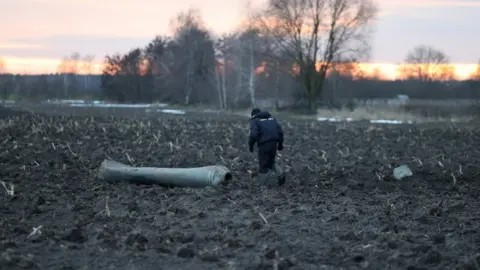Belarus says it downed Ukraine air defence missile
 Reuters
ReutersBelarus has summoned the Ukrainian ambassador, saying it shot down a Ukrainian air defence missile in Belarusian territory.
It happened on Thursday, during one of Russia's heaviest aerial onslaughts against Ukraine so far.
Footage from Belarusian state television appeared to show missile debris in a field.
A Ukrainian military spokesman said the incident was "the result of air defence".
Belarus - a key ally of Russia - has called on Kyiv to carry out a full investigation after the S-300 rocket came down near the border.
Kirill Kazantsev, an officer with Belarusian missile defence forces, has said they are considering two scenarios.
"The first is an accidental launch [by Ukraine] of the air defence missile because of the low training level of the military crew or missile malfunction. The second is a deliberate provocation by the Ukrainian military forces."
It is the first time Belarus has shot down a Ukraine missile since the Russian invasion in February.
The Ukrainian ambassador was called in to the foreign ministry in Minsk.
"The Belarusian side views this incident as extremely serious," spokesperson Anatoly Glaz told the Reuters news agency.
He called on Ukraine to "take comprehensive measures to prevent the recurrence of such incidents in the future".
The Kremlin, meanwhile, has said it was greatly concerned by the incident.
Ukraine's defence ministry said it was ready to invite experts from countries that do not support "the terrorist state of Russia" to help investigate of the incident, adding that it reserved "the unconditional right to the defence and protection of its own sky".
It said it did not rule out a "deliberate provocation" in which Moscow launched its cruise missiles on a path where they would be intercepted over Belarusian territory.
Belarus said the missile came down near the village of Harbacha in the Brest region, about 15km (nine miles) from the border with Ukraine.
A witness told Radio Free Europe: "Our windows were shaking and the house was vibrating from what must have been a sound wave."
The military commissar of the Brest region, Oleg Konovalov, sought to downplay the incident.
"Unfortunately, these things happen," he said in a video posted to social media.
He compared it with an incident last month when a missile landed in Poland, killing two people. Nato chief Jens Stoltenberg said Kyiv's air defences were "most likely" to blame, but Ukraine denied this.
Belarus has very close ties with Russia and allowed Moscow to use its territory in February to start the invasion of Ukraine.
Ukrainian officials recently claimed that Russia could be planning a new offensive from Belarus at the start of 2023. The push, they said, could include a second attempt to seize the capital, Kyiv, and involve tens of thousands of reservists being trained in Russia.
However, in an interview this week with the BBC, Ukraine's spy chief dismissed Russia's activities in Belarus, including the movement of thousands of troops, as attempts to make Ukraine divert troops from the battlefields in the south and east to the north.
Meanwhile, the Ukrainian air force says it has shot down 16 Iranian-made drones that were fired by Russia overnight.
The mayor of Kyiv, Vitali Klitschko, said seven of the drones were headed towards the capital, but that air defence forces shot all of them down, although debris damaged some buildings.
Power has been restored to most regions of Ukraine after it was lost following a huge wave of missile attacks on Thursday.
Moscow fired scores of missiles at cities across the country, including in Kyiv, Kharkiv, Lviv and Odesa.
Ukraine's energy operator, Ukrenergo, has said the situation in the southern and eastern regions is still difficult following repeated attacks by Russia.
Ukrainian President, Volodymyr Zelensky, has warned that more attacks could come, saying Russia wants Ukrainians to celebrate the New Year in the dark.
